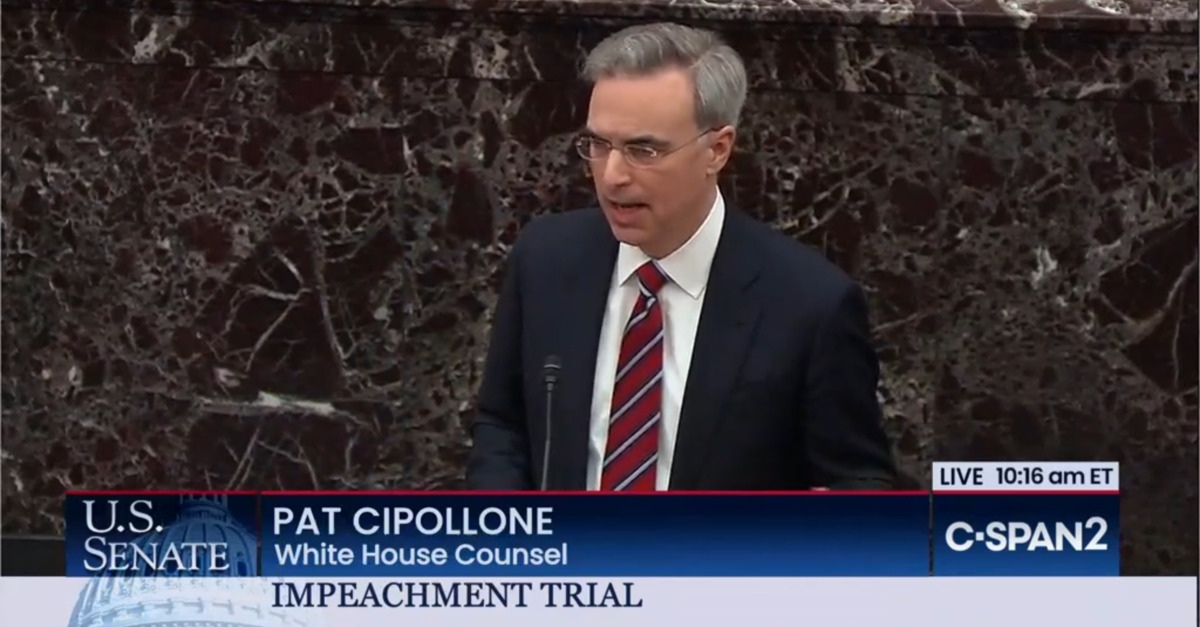
President Donald Trump‘s lead defense attorney in his impeachment trial before the U.S. Senate got things started off in a decidedly Trump-esque and counter-factual manner.
White House Counsel Pat Cipollone began his argument by making the factually inaccurate claim that removing Trump from office would also remove him from the ballot in the 2020 election.
“They are asking you not only to overturn the results of the last election,” Cipollone dissembled before saying: “They are asking you to remove President Trump from the ballot in an election that is occurring in approximately nine months. They are asking you to tear up all of the ballots across this country on your own initiative–take that decision away from the American people.”
“And I don’t think they spent one minute of the 24 hours talking to you about the consequences of that for our country. Not one minute. They didn’t tell you what that would mean for our country,” Cipollone continued. “Today, this year and forever into our future.”
An impeachment proceeding, however, is a removal proceeding. If removed, a separate vote would be required for disqualification–a difference repeatedly elided by the presidential defense team.
The defense’s politically-hued position drew an immediate reaction–negative and positive.
“Cipollone suggests Dems real motivation is to have Trump disqualified from the 2020 ballot,” noted former Republican congressman David Jolly. “As a reminder, the GOP under Trump has currently cancelled presidential primary elections in multiple states so as to remove the President’s opponents from the ballot.”
“Trump defense goes straight for politics vs facts,” noted NBC News political correspondent Heidi Przybyla.
But, as noted, some were quite happy to see Cipollone lie:
Instant celebratory videos and quotes of Cipollone’s unsupported claim were quickly dispatched on Twitter. Not only by official GOP accounts–but by several GOP officials, including Sen. Josh Hawley (R-Missouri) and Republican Party Chair Ronna McDaniel.
Several separate analyses have noted that an impeached president is, in fact, and in no way, barred from running for election again. The U.S. Constitution provides for the removal “and disqualification” of a person from public office–but removal can occur without disqualification. And such instances–of removal without disqualification–have frequently occurred in the past.
University of Missouri School of Law Professor Frank O. Bowman III recently explained one such incident:
If no disqualification vote is held, even a convicted official can reenter federal service. U.S. District Judge Alcee L. Hastings was removed from office in 1989 after he was impeached in the House for engaging in a “corrupt conspiracy” — soliciting a $150,000 bribe in a case before him — and convicted in the Senate. But the Senate took no vote on disqualification. In 1992, Hastings ran for and won a seat from Florida in the U.S. House of Representatives, where he remains to this day.
“If Trump were convicted by the Senate, but the Senate chose not to hold a disqualification vote, he could in theory run again, win and return to the White House,” Bowman continued. “The path to reelection would also be open if a Senate vote favoring disqualification failed.”
The president’s defense repeated the false assertion over and over.
“They come here to the Senate and they ask you, remove a president president, tear up the ballots and all of your states,” Cipollone said near the end of his opening statement.
[image via screengrab/C-SPAN2]